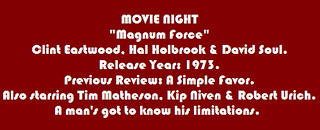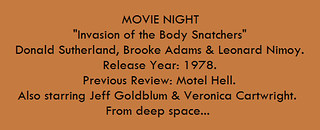
Review #1137: Mr. Brooks.
Cast:
Kevin Costner (Earl Brooks), William Hurt (Marshall), Demi Moore (Detective Tracy Atwood), Dane Cook (Mr. Smith / Graves Baffert), Marg Helgenberger (Emma Brooks), Danielle Panabaker (Jane Brooks), Aisha Hinds (Nancy Hart), and Jason Lewis (Jesse Vialo) Directed by Bruce A. Evans.
Review:
Mr. Brooks is certainly an interesting film to think about, if not for the fact it certainly stands out for its main character - a man addicted to murder, as if they were doing a modern variant on the Jekyll and Hyde tale, to the point where Costner's character goes to twelve-step meetings for addicts to try and curb his "killing addiction". Believe it or not, this was meant to be the first film in a trilogy, and while the film was a mild success at the box office, there were no further follow-ups made. While I can't say that this is a great film, I will say that it is an interesting thing to watch, if not for the twists that it tries to pull and some of its performances being pretty stand-out, even if the film has some deep flaws of its own that can't quite make a success.
Costner and Hurt are easily the highlights for the film, interacting with each other over the nature of what they are bound to do with the kind of energy and interest that you would probably expect from a buddy film. Costner manages to pull off a entertaining performance, balancing the family man aspect of his role handily while also balancing his struggle to deal with his urges as if he was in a werewolf film. It's hard to resist seeing Hurt and his fiendish grin in his role as the alter ego, being watchable each time he appears on screen with his conversations, having fun with the mayhem that he lives on to compel Mr. Brooks to do. One big flaw that comes out from the cast is that there isn't anyone else in the film that actually gets up to the level of Costner and Hurt in terms of performance or presence. Moore plays her detective role with the kind of wooden nature that could only come from humorless television movies, but the more amusing thing is the threads that the film tries to stake on her character. She doesn't just play a detective, she plays a rich detective who does what she does for her own reasons, which the film likes to explain in the end as some sort of sting. In any case, there isn't any scene where she gives enough energy to make this role seem remotely interesting, being one of the lulls that stops the film's momentum. Would you expect that Moore's character has three plot-lines? Yes, between her investigation into the serial murders in the main thread, there is also the thread of her divorce and the thread about another killer that has escaped from jail that she put away that is in the pursuit of her - named the Hangman. The other lull is in Cook, playing a character seemingly devoid of charm or interest, which I suppose makes sense when playing someone who is trying to parrot Costner's character. Perhaps this would've worked if Cook (a stand-up comedian playing a dramatic role for some reason) actually made this person someone I wanted to be around with Costner and Hurt. Perhaps someone with a bit more charm (or possibly less time on screen) would've made the film run without less stoppage to it. Yes, the character is a slimy one, but it at least could've been a useful slimy one to be around with. Strangely enough, there isn't as much time for Helgenberger and Panabaker, who have minimal time on screen to be around Costner for this on-screen family. Maybe there would've been more for them to do if there had been sequels (and I put that generously), but there had to be another way to have them more involved. I feel like the parts with Costner and Panabaker should've had more of a focus, since she basically only has three brief scenes, and she basically disappears after the first hour. Yes, her character does have a function to at least one plot thread, but it doesn't really resonate as much as it could have. Spoiler alert, her character also committed a murder, as if she inherited it from her dad. Sure, why not. There are just as many plot threads than actual deaths in this film. By the time it gets to its climax, the film essentially collapses from exhaustion. It can be a creepy film sometimes, when it involves the nature of what makes Mr. Brooks who he is, but it isn't as effective as it probably should've been.
With all of its attempts to pull so many twists and narratives, the film can't quite execute at a fair rate, where there become so many threads that it almost feels needless. After a while, it becomes exhausting to wonder why there are so many plot threads going about in a film that probably should've just stuck to a bit more simple for a psychological thriller that manages to last two hours. When it wants to be just Costner and Hurt, the film works just fine, but when it tries to verge on others in its small cast, it feels a bit distracted and not too particularly focused. This may have worked better a television series with all the threads it wants to throw around, but even with that it mind, it's just a frustrating movie to sit through. I like the idea of where it wants to go with Costner and Hurt, but the final product just isn't enough to fully give thrills and satisfaction without becoming ridiculous and overstuffed. It's the kind of movie that might serve as a guilty pleasure for ones in the right mindset, or ones with more patience in mind for where it ultimately lingers.
Overall, I give it 6 out of 10 stars.








